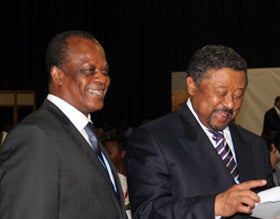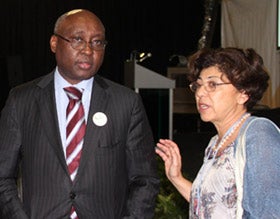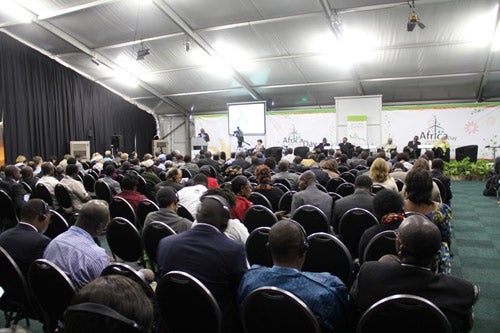PRESS RELEASE French Version

(in the picture from left: Mr. Mahamat Bechir Okormi, Minister of Environment and Fisheries of Chad, H.E. Souleymane Ndene Ndiaye, Prime Minister representing H.E. Maitre Abdoulaye Wade, President, Republic of Senegal, Mme. Monique Barbut, CEO and Chairperson of the GEF, H.E. Henri Djombo, Minister of Environment of Congo, and Mme. Rachel Kyte, World Bank Vice President for the Sustainable Development Network)
DURBAN, South Africa, December 8, 2011 – Monique Barbut, CEO and Chairperson of the Global Environment Facility (GEF), hosted a discussion of African leaders and international development organizations on the combined efforts to protect and enhance the key natural resources of sub-Saharan Africa.
The participants included representatives of South Africa, Ethiopia, Chad, Congo, Gabon and Senegal, as well as World Bank Vice President Rachel Kyte, African Union Commission Chairman H.E. Jean Ping, and Donald Kaberuka, President of the African Development Bank. All strongly support three initiatives aimed at restoring Central Africa's key water resource, preventing the desertification of sub-Saharan Africa, and protecting the vast Congo Basin rain forest. The means to that end is climate-resilient development, so that economies can grow and livelihoods improve while the natural resources on which lives depend are protected and enhanced.
The GEF, world's largest public funder of international environmental projects, is responsible for funding the projects and coordinating the cofinancing of the total $2.36 billion(including $14.8 million from the LDCF and $4.6 million from the SCCF) for the three initiatives together, said these initiatives reflect the importance of merging economic and environmental priorities.

hle-7.jpg
|

hle-5.jpg
|
|
| From left: H.E. Henri Djombo, Minister of Environment and Forest Economy of the Republic of Congo, and H.E. Jean Ping, Chairman, African Union Commission | From left: Mme. Monique Barbut, CEO and Chairperson of the GEF, and Mr. Donald Kaberuka, President, African Development Bank |
"The nations involved, and their allies in the international community, seek ways to pursue sustainable development in sub-Saharan Africa through careful management and protection of natural resources, including land, water and forests," GEF CEO Barbut said. "These nations, spanning a vast region from the Sahel to the Congo basin, fully understand what is at stake for their own people and their national economies. The lives and livelihoods of hundreds of millions of Africans depend on sustaining the health of these fragile ecosystems."
The Great Green Wall project focuses on sustainability and resistance to climate change in the Sahel. Drought, land degradation and water scarcity, perennial problems in this region, are now exacerbated by climate variability. Careful management of scarce natural resources is critical not only to the livelihoods of millions in this region covering 5 percent of the continent, but also to survival. The Great Green Wall Initiative of the Sahel and Sahara integrates management of dryland forests, agroforestry parklands, agricultural landscapes, and pastoral systems.
The Congo Basin, home to the world's second largest tropical rain forest, covers an area the size of India. These forests contain the largest repository of biodiversity on the continent, extending across five countries – Cameroon, Congo, Democratic Republic of Congo, Gabon and Central African Republic. The Congo Basin Partnership involves local, national and international entities in implementing a collective vision to safeguard these forests as assets for climate-resilient development. At the same time, preservation of this forest system would represent a major contribution by Africa to protecting the global climate.
Lake Chad is the second largest wetland in Africa and a lifeline for nearly 20 million people in central Africa. The freshwater and rich biodiversity in the lake and surrounding wetlands is shared by Cameroon, the Central African Republic, Chad, Niger and Nigeria. But the surface area of the lake has shrunk dramatically, declining from 25,000 square miles 45 years ago to 2,500 square miles today.

Today's event comes one year after COP 16 in Cancun, where Prime Minister Meles Zenawi of Ethiopia, speaking on behalf of Africa, presented these three initiatives as priorities of the African Union.The situation is urgent: Climate change projections indicate that nearly one-third of the land base in Africa is under threat of desertification, and the continent as a whole is on a path to be hit hard by deforestation and drought, along with the reduction of available fresh water and consequent food insecurity. The wellbeing and livelihood of 70 percent of the continent's population is at stake.
###
For more information contact John Diamond, GEF Senior Communications Officer, at jdiamond@thegef.org, +202-458-7953. In Durban, contact Christian Hofer, GEF Senior Communications Officer, at chofer@thegef.org, +1 202 413 41 85.
Alexandre Pinheiro Rego
Senior Communications Officer
arego@thegef.org


